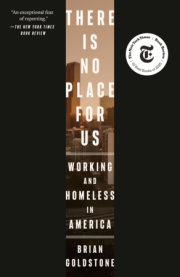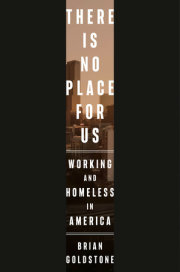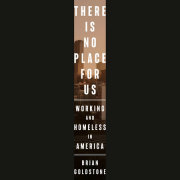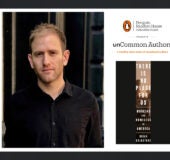1Britt scrutinized her face in the bathroom mirror, hoping she looked less tired than she felt. Sleep had been hard to come by since she began working the closing shift at Low Country, a “new Southern cuisine” restaurant at Hartsfield-Jackson International Airport. Some nights, after a grinding hour-plus commute from the airport back to her great-grandmother’s apartment in Atlanta’s East Lake neighborhood, she managed to crawl into bed beside her two-year-old son, Kyrie, and four-year-old daughter, Desiree, without waking them. Last night she was not so lucky: Kyrie stirred and Britt was up with him until well past midnight. No sooner had they finally drifted off than Britt’s phone alarm sounded, and it was all she could do to get the kids dressed and fed by six o’clock, when their daycare van arrived. Now, seven hours later, she massaged cocoa butter moisturizer onto her cheeks and forehead. Good enough, she thought with a sigh.
“Britt!” her great-grandmother bellowed over a television commercial. “Don’t forget to tidy up my living room before you leave!” Britt examined herself one last time. She hadn’t been able to wash her line-cook uniform between the previous night’s shift and the one she would be starting shortly, but the stains weren’t too noticeable.
For five months, Britt and her kids had been living out of several oversized tote bags in a corner of the apartment’s compact living room, next to the pullout sofa bed they shared. An ironclad rule at Granny’s apartment was that you pick up after yourself, and as Britt rushed to fold their clothes and blankets, she tried to arrange everything as neatly as possible. She had never asked Granny for a closet or dresser drawer in which to keep these items, in part because it seemed like there wasn’t any room to spare—the older woman had a propensity to squirrel away whatever toy or child’s sweater or pajama set she thought could be handed down to the family’s newest members—but mostly because she needed to believe that their stay at her apartment was only temporary. For her part, Granny made it clear in her own loving but not particularly subtle way that she was in no need of roommates. Britt described it to a friend as a “don’t get too comfortable” situation.
After reassembling the sofa bed and arranging its cushions, Britt hurried into the kitchen to finish preparing the kids’ dinner for later: chicken tenders, rice, green peas, and Pillsbury Crescent Rolls. She glanced at Granny, perched in her rocking chair a few feet away from the TV. Britt often marveled at the disconnect between this kindly arthritic woman, who passed the hours glued to
Judge Mathis or Tyler Perry’s
Madea movies while clutching her large-print Bible, and the stories she’d grown up hearing about her. Britt’s favorite photo of Granny from her younger years showed a scowling, self-professed hustler outside Butler’s Shoes in downtown Atlanta, sporting an all-white Levi’s denim suit with a smart red bow tie. These days the sole vestige of Granny’s former self was her fierce independence, which a recent diagnosis of Alzheimer’s had done little to diminish.
“Girl, it’s almost one-thirty. Shouldn’t you be on your way?” Britt hadn’t noticed her mom, Cass—short for Cassandra—enter the apartment. As always, the forty-three-year-old had a brusque, tightly coiled energy. She greeted Granny with a quick kiss on the top of her head.
“I’m making food for Des and Kyrie,” Britt replied. “If you could just throw it in the microwave when they get back—”
Cass cut her off. “What? You think I can’t put together some nuggets for my grandchildren?” She said this playfully, if a bit defensively. For a brief moment Britt stared at her, as if there was a lot she could say in response. “You get going and let me handle this,” Cass said.
At the front door, beside Granny’s “wall of fame,” where dozens of pictures taken at graduations and proms and athletic events had been assembled, Britt put on a thin, stylish camouflage-print jacket. “Where’s your coat at?” Cass yelled from the kitchen. “You know how cold it is? Why don’t you step out on that patio and find out.”
“Oh, she thinks she too cute for a puffy jacket,” Granny teased.
“Well, her ass is gonna freeze,” Cass said. The two women laughed. Britt, grinning, said, “Yeah, yeah,” and shut the door behind her.
Outside, Britt headed toward the bus stop on Glenwood Avenue. She had been walking this route since she was a toddler. Granny’s apartment building was a stone’s throw from the public housing project where Britt had spent the first few years of her life. Five generations of the family had lived together at East Lake Meadows. That had not been the plan. When Granny’s mother—“Big Mama,” as everyone called her—landed a job at an Atlanta printing factory in 1961, her hope was to eventually purchase her own house. But this was before the Fair Housing Act was signed into law. A century of housing discrimination ensured that the path to homeownership remained closed to the majority of Black Americans. Unlike some of her white co-workers, who were approved for low-interest mortgages and able to move to the nearby suburbs, Big Mama and her progeny were confined to Atlanta’s renter class—spending ten years at an apartment at 949 Washington Street, located in the predominantly Black Peoplestown neighborhood, before relocating to East Lake Meadows in the early seventies.
In the public imagination, the 650-unit complex known as “Little Vietnam” was rampant with crime and violence, but Britt’s family spoke about it differently, as a place where people managed to forge a community despite living in terrible conditions. And the conditions were abysmal. Government neglect had plagued the project from the very beginning. Then, in the early nineties, Atlanta real estate titan Tom Cousins purchased the historic but derelict East Lake Golf Club, which bordered the housing project. Instead of advocating for the city to renovate the complex, he began calling for its demolition: his goal was to “rehabilitate” the neighborhood surrounding the golf course. Soon the complex was razed.
By 2001, when Britt was eight, the area had its first grocery store, a charter school, and The Villages of East Lake, a privately owned apartment complex built on the former site of East Lake Meadows. Cousins’s revived golf club became the annual host of the prestigious PGA TOUR Championship. The neighborhood’s rapid change was celebrated in media reports across the country, but not everyone benefited from it: because of strict eligibility requirements and the limited number of apartments set aside for low-income households, a mere 15 percent of the families residing at East Lake Meadows before its demolition were able to move into the new development. Granny and Big Mama, who died shortly after settling into her unit at the Villages, were among this select group. Cass and her kids were forced to go elsewhere.
A cold February wind cut through Britt’s outfit as she raced to catch the bus on Glenwood that would take her to MARTA’s Edgewood-Candler Park station and, from there, after transferring at Five Points, to the domestic terminal at Hartsfield-Jackson. As Britt rounded the corner, she saw that her bus was already approaching. She had to sprint to catch it.
It was only when she boarded the Gold line train at Five Points that Britt allowed herself to relax. She put in her earbuds and closed her eyes. The gentle opening notes of “Be Blessed” by Yolanda Adams—first an unadorned piano, then the deep, resonant tones of a gospel organ—began to settle her nerves. Prone to minor panic attacks, Britt had come up with strategies to stave off such episodes. Although she didn’t consider herself religious, listening to this song had a way of grounding her. It was as if Adams were an older, wiser friend, perfectly aware of Britt’s traumas and regrets but steadfast in the conviction that she need not be defined by them.
I want you to be blessed, don’t live life in distress
Just let go, let God, He’ll work it out for you
I pray that your soul will be blessed
Forever in His hands, for you deserve His best, no less.
Britt played the song twice and, when it ended, realized there was only one stop left before she arrived at the airport. As she had already done a number of times that day, she checked her email. She wasn’t expecting to see the message she’d been waiting for, but she still felt a pang of disappointment when it wasn’t there.
Copyright © 2025 by Brian Goldstone. All rights reserved. No part of this excerpt may be reproduced or reprinted without permission in writing from the publisher.













